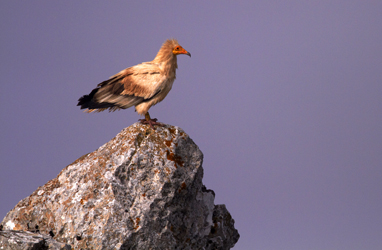The monitoring of an experimental feeding station established in northern Spain allowed the evaluation of how this type of resource, predictable in space but not in time, was exploited by a guild of avian scavengers in relation to factors such as season, hour of disposal and presence of the dominant species. The presence of Egyptian Vultures at carcasses was more likely during spring, and richness and diversity of avian scavengers was lower during the summer and when Griffon Vultures arrived earlier. The temporal unpredictability of the resource may favour exploitation by smaller and less competitive scavengers in comparison with feeding sites with continuous presence of carcasses. New European regulations may present an opportunity to develop effective conservation measures to support functional scavenger assemblages. informacion[at]ebd.csic.es Arrondo et al. (2015) Temporally unpredictable supplementary feeding may benefit endangered scavengers. Ibis 157, 648–651 DOI: 10.1111/ibi.12267
http://onlinelibrary.wiley.com/doi/10.1111/ibi.12267/abstract

 Las altas temperaturas están provocando que las lagunas y las marismas de Doñana pierdan agua rápidamente
Las altas temperaturas están provocando que las lagunas y las marismas de Doñana pierdan agua rápidamente




